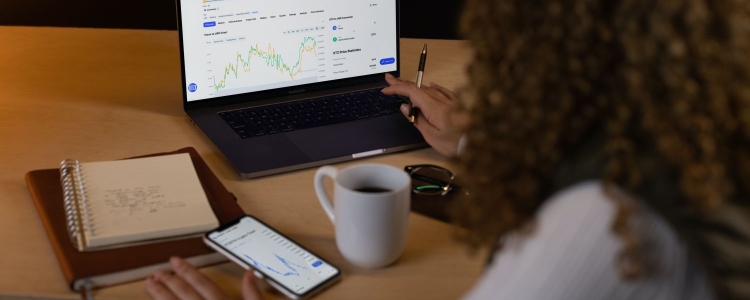What Are Your Savings & Investment Strategies Right Now?
This post may contain affiliate links and Corporette® may earn commissions for purchases made through links in this post. As an Amazon Associate, I earn from qualifying purchases.

The stock market has been crazy lately, as has inflation, so let's talk about savings and investment strategies that you may be using right now. Are you selling stocks and index funds — or buying them with a “sale!!” mindset? Are you saving more money in cash accounts because the markets are going wild and everything is getting more expensive? In related matters, are you deliberately curtailing your spending, e.g., eating out less, taking fewer car trips requiring gas? For those of you who do automatic investments and send money automatically to savings, have you changed your strategies at all?
{related: how to react to a stock market drop}
My Own Savings and Investment Strategies Right Now
For my $.02 (noting that I am not a financial advisor or financial professional!), I actually bought a lot of index funds in the first half of the year (a lot for me, at least) because I was moving some money around, and I kind of have a “sale!” attitude now. I bought some more individual stocks back in April when prices were nearing their 52-week lows… but we've blown through a lot of those records now. (You can set up automatic alerts in both Vanguard and Schwab pretty easily for individual stocks.)
{related: how to set up automatic investing}
Also around April, we invested half of our total investment in my husband's Roth IRA for 2022, and I'm keeping an eye on prices for the next half… but I've moved the money over from savings so I'm more or less ready to go if I happen to notice the market is super low one day. I've thrown a few extra dollars at our 529 accounts but haven't yet changed our regular contribution, which is spread out over the year evenly — I'd be curious if others have changed regular contributions like 529 accounts, 401ks, etc.
(I'd also be curious if anyone has changed their payoff strategy for student loan debts so the extra principal that would have gone to loans has now gone to the stock market? (Always pay the principal!))
{related: how to pay off big student loans and other big debts}
The big question, of course, is whether the market will go even lower — and for more than just a dip but a sustained period. (Or, that the entire market has been artificially inflated in recent years and we won't see the prices from six months ago for a long, long time.) I don't know any the answers, of course. My general attitude has always been that it's hard to time the lowest point and the highest point, but as long as I've avoided the highest point I'm doing OK.
I also read an article years ago (The Atlantic, I think) that influenced this attitude, and I'll try to see if I can find it: The author basically said that even if you had bought stock on the eve of the great stock market crash of 1929, you'd have profited from it after a certain amount of years had passed. (Not the article I remember, but this NYT article from 2009 notes that you'd have been in the black by late 1936.)
{related: not sure what to do first/next in your personal finance journey? here's our money roadmap}
In terms of savings, as I've written about before, we have multiple savings accounts set up for multiple financial goals (vacations, health, insurance) that are automatically funded with certain amounts every month. Some of those accounts are fully “stocked” because, for example, we haven't taken a ton of vacation trips over the past three years, so I have really decreased a lot of those contributions and put the remaining funds into an automatic investment purchase of $X of an index fund (VTSAX, I think). But that decision was admittedly made before the market felt quite so volatile.
{related: how to automate your savings}
Readers, how about you — what are your savings and investment strategies right now? How have they changed from 6-12 months ago? (If you're more wary of the stock market than I am, what factors are you watching?)
{related: financial tips for new lawyers (or other women in their first high-paying jobs!)}
Stock photo via Stencil.


It just so happens that this downturn exactly matches the first time I’ve had lots of extra money to direct to my taxable brokerage. Im really trying to catch up on retirement. Thanks to higher education + student loans which provided for my high paying job, I’m way behind the “2x your salary at 35 benchmark,” which I’ll admit to finding quite distressing (though I know I’m much better off than the average American.) While past returns do not predict future growth, I’m really hope that dumping money into low cost index funds continues to be the right move, as it’s the one I’m taking.
I met the 2x salary at 35 because my salary was (is) so low. If you are making good money and saving ow, you will be fine (or as fine as one can predict).
Pray.
Does not looking at balances count as a strategy? Intellectually I know it’s good to just stay the course during a downturn, but we have (so far) lost the equivalent of the down payment for our next house and it smarts.
According to one study, that may be the best strategy: https://lifehacker.com/the-best-investors-literally-forget-about-their-portfol-1782581085/amp
Not only does it count as a strategy, it’s an excellent one!
We had been holding on to more cash than usual in hopes of needing it for moving expenses or to supplement our down payment. Thanks to interest rate hikes, now we’re just dollar-cost averaging it back into the market at our age-based asset allocation.
The host of a podcast I like used to joke on days when there was a market downturn that there was a “sale at the stock store” and I’m fortunate to be young enough and financially secure enough that that’s how I see it. (I am concerned for my retired parents, though.)
This is my strategy in all markets. Dollar-cost averaging, rebalance periodically, only look at accounts once a quarter.
The only thing I’m doing differently is that I did buy some i-Bonds to protect some cash savings designated for use ~4 years from now against inflation.
how to buy I-bonds? read WAPO article that said people had multiple issues trying to purchase I bonds online. Any info greatly appreciated
Go to TreasuryDirect.gov,
Individuals Category then
How to Buy Series I.
I found the process fairly easy. Using my checking account at Schwab, it was an online transfer to TreasuryDirect. The minimum purchase amount is $25. I purchased 2 bonds for $5,000 each, just in case I would need some of the money in 5 years.
This article does a great job covering how to buy iBonds. It is the Washington Post, so there is a paywall, but I think there is a free article limit (?): https://www.washingtonpost.com/business/2022/06/22/step-by-step-guide-to-buy-i-bonds/
We moved some of our long term savings to US Treasury I Series Bonds. Maximum contribution is $10,000 per year with a current interest rate of 9.62% for the next 6 months (previous 6 months was 7.12%). If the money is withdraw within first year, all interest is forfeited. Between Years 1 to 5, only 3 months of interest is forfeited.
I discovered “i” bonds at the start of this year. As safe as a CD, but matches inflation. There is an annual limit, but you can latter them as a safety net, oh sh*t fund.